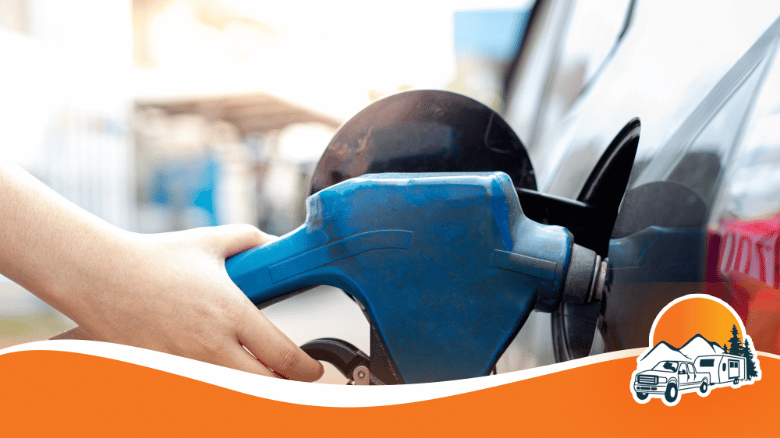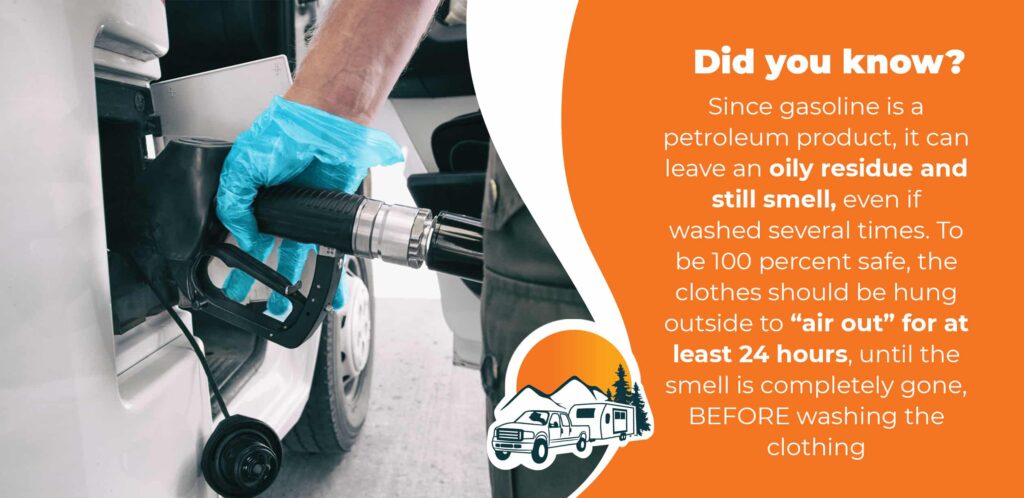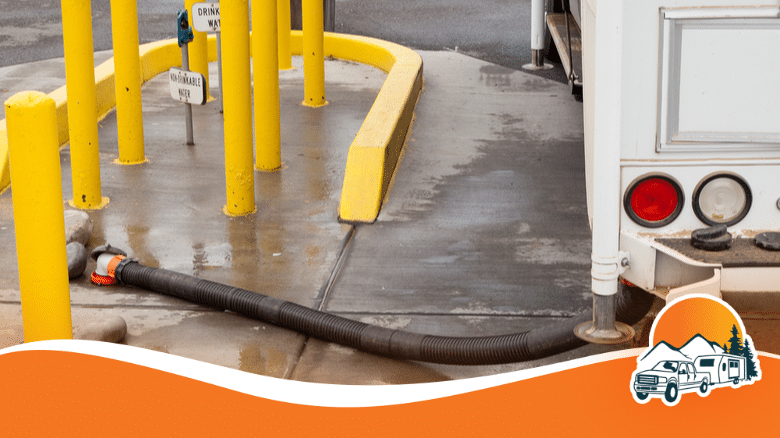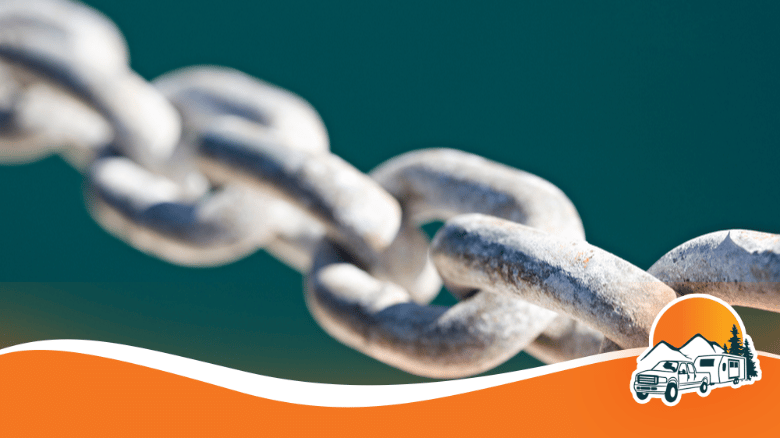Ever tried scrubbing away the smell of gasoline from your hands, only to find that stubborn scent clinging on? If you’ve had a run-in with gas fumes while refueling your car or cleaning out the garage, you know how tricky it can be to remove gas smell from hands and clothes. It’s not just about washing; there’s chemistry involved!

The strong odor isn’t merely unpleasant—it can lead to headaches and nausea. But fear not! With a bit of knowledge about why this persistent aroma sticks around, and armed with some practical DIY solutions up our sleeves, we’ll conquer those pungent whiffs together.
We’ll explore the science behind gasoline odors in fabrics, revealing quick actions for immediate spill responses. These include effective use of hand soap or dish detergent. But we won’t stop there – our journey will take us even further into specialized solutions.
- Understanding the Persistence of Gasoline Smell
- How Gasoline Interacts with Fabric Material
- Quick Actions for Immediate Gasoline Spill Response
- Special Cleaning Agents for Removing Gasoline Smell from Hands
- DIY Solutions for Removing Gasoline Smell from Clothes
- FAQs in Relation to How to Remove Gas Smell From Hands and Clothes
- Conclusion
Understanding the Persistence of Gasoline Smell
If you’ve ever filled up your recreational vehicle’s tank with petrol, it’s likely that you know the scent of gas which lingers. This potent odor is more than just a nuisance; it’s indicative of volatile organic compounds (VOCs) present in petroleum products like gasoline.
When these VOCs come into contact with our skin or clothes, they leave behind a distinctive gas odor. But why does this scent persist? The answer lies within the chemical properties of gasoline itself.
The structure and composition of gasoline, which consists primarily of hydrocarbons, allows it to bind easily to fabric materials and human body tissues such as skin cells. This binding creates an enduring link between the substance and its host – be that your favorite shirt or bare hands.
Besides being sticky on a molecular level, there’s another reason for persistent gas odors: evaporation rates. As much as we’d love for spilled fuel to simply vanish into thin air after exposure to oxygen, reality proves otherwise.
Gasoline vapors linger because they don’t evaporate all at once but rather gradually over time—a process that can last several hours depending on conditions like temperature and humidity levels PubChem.
Nervous System Implications
In addition to their staying power on surfaces, some components found in petrol fumes pose potential health risks due largely part to their impact on the nervous system. Benzene, a known carcinogen, is among these harmful constituents.
Regular exposure can lead to headaches and dizziness in the short term while chronic exposure may increase risk for diseases like leukemia American Cancer Society.
So, grasping the stubborn character of gasoline and mastering its removal from our skin and clothes isn’t just about feeling comfortable or looking good. It’s also vital for maintaining our health.
Key Takeaway: Gasoline’s potent smell sticks around because of its chemical makeup, binding easily to fabrics and skin. The scent lingers due to gradual evaporation rates, sometimes lasting hours. But this isn’t just a smelly nuisance – some gasoline components can affect our health if regularly exposed. So getting rid of gas smells from clothes and hands is about more than comfort; it’s also an important step towards maintaining good health.
How Gasoline Interacts with Fabric Material
The tenacity of gasoline smells on your clothes can be traced back to how gas interacts with fabric materials. Just like a persistent party guest, the gasoline vapors latch onto your fabrics and refuse to leave.
Fabrics are porous, much like sponges. This allows them to soak up liquids effectively but also makes it difficult for these substances to escape once they’re trapped in the fibers. It’s kind of like trying to remove honey from a sponge – tricky and sticky.
Gas spills not only lead to odorous issues but can also result in unsightly stains. The chemicals found within gasoline penetrate deeply into the fabric material, resulting in stubborn spots that might ruin your favorite shirt or pants if not addressed properly.

The Science Behind Gas Stains & Smells
You may have noticed after handling gas that its smell tends not just linger on hands, but sticks around longer than most other scents too. Well, there’s science behind this nuisance; specifically, petroleum residue’s knack for sticking around.
This petroleum-based product is composed primarily of hydrocarbons – long chains of hydrogen and carbon atoms – which easily bind with organic matter (like clothing).
These strong bonds make it hard for us mere mortals – or our washing machines – to break them down fully during cleaning processes. Hydrocarbons’ complex structures, coupled with their water-repellent properties (‘hydrophobic’ if you want to get fancy), further complicates the process of eliminating gasoline stains and smells.
Continued contact with gasoline vapors can have detrimental effects on one’s nervous system, such as headaches, dizziness, or skin irritation. Studies show symptoms such as headaches, dizziness, or even skin irritation may arise from continued contact with gasoline vapors.
Fabric Material’s Role in Gas Stains & Smells Persistence
up a lot of sweat, your gym gear made from synthetic material might not. It’s interesting to see how the type of fabric can really change our experience with clothing.
Key Takeaway: Gasoline’s stubborn odor and stains on clothes are due to its interaction with fabric materials. Like a sponge, fabrics soak up the gasoline but struggle to let it go. This petroleum-based product forms strong bonds with organic matter, making them tough for regular cleaning processes to break down completely. The type of fabric can also impact how persistent these smells and stains become.
Quick Actions for Immediate Gasoline Spill Response
Gas spills can occur unexpectedly and require quick action to remove gas residue and prevent lasting odors. Remember, time is of the essence when dealing with these incidents.
Using Hand Soap and Hand Sanitizer for Immediate Cleanup
If you’re surprised by a gasoline spill, hand soap or hand sanitizer can be used as quick solutions to reduce the concentration of fuel on skin and fabric. Their primary role isn’t to remove grease, but they do help in diluting the concentration of gasoline on skin or fabric.
A thorough wash using these products may not completely eradicate the smell right away, but it will significantly reduce its intensity. Treating gasoline stains as soon as possible is crucial; this initial step helps ensure easier removal later on in the washing machine process.
The Role of Dish Soap in Gas Spill Cleanup
Dish detergent has proven effectiveness against stubborn residues such as oil and fat because it’s designed to break down those substances during dishwashing.
The same principle applies when trying to remove gas from hands or clothes – its powerful formula makes it an excellent choice for eliminating persistent smells.
Dilute some dish soap in warm water then scrub gently until you see foam forming – that’s a sign that dirt particles are being lifted from surfaces due to their interaction with soap suds.
Make sure all areas affected by gas spills have been treated before proceeding further into cleanup operations involving more specialized tools if needed.
Note: Avoid rubbing too hard while scrubbing since friction could lead to fabrics becoming damaged, which might cause them to lose their ability to retain shape properly after the drying process completes.
Once you’ve taken these immediate steps, it’s time to consider more specialized solutions. The Drivin’ & Vibin’ team, seasoned campers and experts in all things RV, suggest several household items that can help remove gasoline odors effectively.
Key Takeaway: When a gas spill happens, act fast. Use hand soap or sanitizer to dilute the gasoline on skin or fabric. Then, turn to dish soap – its grease-fighting power works wonders on stubborn gas smells. Remember not to scrub too hard though; you don’t want damaged clothes. For tougher odors, consider using household items recommended by RV experts.
Special Cleaning Agents for Removing Gasoline Smell from Hands
When gas odors linger on your hands, they can be a real nuisance. Specialized cleaning agents have been developed to address this issue directly.
The Power of Citric Acid in Lemon Juice Washing
Lemon juice washing packs quite the punch when it comes to removing gasoline odor from hands. The secret lies in its high citric acid content which works wonders by breaking down the chemical bonds of gasoline. Scientific American says lemon’s acidic properties make it a natural deodorizer.
You might not have known this but you’ve probably got one of these powerful cleaners right at home: fresh lemons. Simply squeeze some onto your hands and scrub thoroughly before rinsing with water. It’s surprising how such an everyday item can provide effective relief.
Using Grip Clean for Gasoline Smell Removal
Moving beyond traditional solutions, we find innovative products like Grip Clean, a popular mechanics soap specifically formulated to remove stubborn smells, including gas residue.
This exfoliating soap uses all-natural ingredients such as bentonite clay and olive oil that work together effectively against strong odors without causing skin irritation. A bonus? It also leaves your hands feeling soft after each wash.
Facts Check: Not only do mechanics soap and lemon juice work wonders, but household items like vinegar, baking soda, baby wipes, and even orange peel water can also help remove that stubborn gas smell from your hands. The drivin’ & vibin’ team confirms this in their blog post.
DIY Solutions for Removing Gasoline Smell from Clothes
There’s nothing quite like the stubborn stench of gasoline. Don’t fret, we’ve got some tried-and-true DIY solutions to get rid of that persistent gas odor.
Vinegar: The Old Reliable
You can always count on good old white vinegar. This trusty household staple breaks down the oil in gasoline. Soak your clothes in a mix of one part vinegar and two parts water before tossing them into a hot cycle.
Baking Soda: Not Just For Baking Anymore.
Next up is baking soda, another kitchen essential with amazing cleaning abilities. Create a paste using three parts baking soda and one part water; apply it to affected areas as an odor eliminator before washing your clothes normally.
Coffee Grounds: A Surprisingly Effective Solution
If you’re looking for something more unconventional yet effective, try coffee grounds. Coffee absorbs odors well because it contains nitrogen which helps neutralize volatile sulfur compounds responsible for bad smells including those from gas fumes. Science backs this up too.
| Solution | Action |
|---|---|
| Vinegar | Mix 1 part vinegar & 2 parts water, soak then wash on hot cycle. |
| Baking Soda Paste | Create paste (three-parts soda to one-part water), apply to areas, then wash normally. |
| Coffee Grounds | Apply coffee grounds directly onto the stain, leave for an hour then brush off and wash. |
ensure your clothes are thoroughly cleaned. Gasoline-soaked shirts require more than just a regular wash cycle, they need specific treatments to get rid of the stains and smells. So, don’t take shortcuts when it comes to laundry day – use these specialized solutions for optimal results.
FAQs in Relation to How to Remove Gas Smell From Hands and Clothes
How do I get the gas smell out of my hands?
Rub your hands with lemon juice or a mechanic’s soap like Grip Clean. They break down gasoline’s chemical bonds and scrub off its smell.
What neutralizes the smell of gasoline?
Vinegar, baking soda, and citric acid in lemons can neutralize gas odors. For clothes, try soaking them in vinegar or washing with baking soda.
Does washing your hands get rid of gasoline?
A simple wash might not cut it because gasoline clings to skin. Use soaps designed for tough stains or natural cleaners like lemon juice instead.
Are my hands clean if they still smell like gas?
If there’s no residue but you still sniff some odor, don’t fret too much. Gasoline vapors can linger even after thorough cleaning – it doesn’t mean you’re dirty.
Conclusion
Gasoline smells are stubborn, but they’re not invincible. We’ve explored the science behind their persistence and uncovered some effective DIY solutions on how to remove gas smell from hands and clothes.
Act fast when spills happen! Hand soap or dish detergent can do wonders in immediate cleanup scenarios. But remember, these are just the start of your arsenal.
Lemon juice washing breaks down gasoline’s chemical bonds while Grip Clean and similar mechanic soaps target that lingering scent on hands. The same goes for clothes; vinegar, baking soda, coffee grounds – each has its unique role in combating gasoline odors.
Understanding is power – now you’re armed with practical strategies to conquer those pungent whiffs!







